The ketogenic diet (or keto for short) is a low-carbohydrate, high-fat diet that offers many health benefits.
In fact, over 20 studies show that this type of diet can help you lose weight and improve your health.
Keto may even have advantages over diabetes, cancer, epilepsy and Alzheimer’s disease.
Just check out these studies: 1, 2, 3, 4, 5
This post is a detailed guide for beginners to start the keto diet.
What is a ketogenic diet?
The ketogenic diet is a very low-carbohydrate, high-fat diet, which has many similarities with the Atkins and low-carbohydrate diet.
In this diet, the intake of carbohydrates is drastically reduced and replaced by fat. This reduction in carbohydrates puts your body into a metabolic state called ketosis.
When this happens, your body becomes incredibly efficient at burning fat for energy production. This involves converting fat in the liver into ketones that can supply the brain with energy.
Keto can lead to a massive reduction in blood sugar and insulin levels. This, together with the increased ketones, has numerous health benefits.
In summary, the keto diet is a low-carbohydrate, high-fat diet. It lowers blood sugar and insulin levels and shifts the body’s metabolism away from carbohydrates to fat and ketones.
Different Types of Keto Diet
There are several versions of ketogenic nutrition, including:
- Standard Ketogenic Diet (SKD): This is a very low carbohydrate, low protein, high fat diet. It typically contains 75% fat, 20% protein and only 5% carbohydrates.
- Cyclic Ketogenic Diet (CKD): This diet includes periods of higher carbohydrate reductions, such as 5 ketogenic days, followed by 2 carbohydrate-rich days.
- Targeted Ketogenic Diet (TKD): This diet allows you to add carbohydrates around training.
- High Protein Ketogenic Diet: This is similar to a traditional ketogenic diet, but contains more protein. The ratio is often 60% fat, 35% protein and 5% carbohydrates.
However, only the standard and high protein ketogenic diet has been studied in detail. Cyclic or targeted ketogenic diets are more advanced methods and are mainly used by bodybuilders or athletes.
The information in this article applies mainly to standard ketogenic diets (SKD), although many of the same principles apply to the other versions.
So, there are several versions of the keto diet. The standard version (SKD) is the most frequently researched and recommended.
The Keto Diet Can Help You Lose Weight

A ketogenic diet is an effective way to lose weight and reduce the risk of disease.
In fact, research shows that ketogenic diets are far superior to the often recommended low-fat diet.
Moreover, the diet is so full that you can lose weight without counting calories or keeping track of your food intake.
One study found that people on a ketogenic diet lost 2.2 times more weight than people on a low-calorie, low-fat diet. Triglyceride and HDL cholesterol levels also improved.
Another study found that people on a ketogenic diet lost three times more weight than on the diet recommended by Diabetes UK.
There are several reasons why a ketogenic diet is superior to a low-fat diet, including increased protein intake, which offers many benefits. Increased ketones, lower blood sugar levels and improved insulin sensitivity may also play a key role.
A ketogenic diet can help you lose much more weight than a low-fat diet. This often happens without hunger.
Keto Diet for Diabetes and Pre-Diabetes
Diabetes is characterized by changes in metabolism, high blood sugar levels and impaired insulin function.
A ketogenic diet can help you lose excess fat, which is closely linked to type 2 diabetes, pre-diabetes and metabolic syndrome.
One study found that a ketogenic diet improved insulin sensitivity by a whopping 75%.
Another study of people with type 2 diabetes found that 7 of the 21 participants were able to stop taking all diabetes medication.
In yet another study, the ketogenic group lost 24.4 pounds (11.1 kg) compared with 15.2 pounds (6.9 kg) in the higher carbohydrate group. This is an important advantage when considering the relationship between weight and type 2 diabetes.
In addition, 95.2% of the ketogenic group were also able to stop or reduce diabetes medication, compared with 62% in the higher carbohydrate group.
Basically, following a keto diet can increase insulin sensitivity and cause fat loss, resulting in significant health benefits for people with type 2 diabetes or pre-diabetes.
Check out my post here for more information about the benefits of the keto diet on diabetes.
Other Health Benefits of Keto
The keto diet was actually developed as a means of treating neurological diseases such as epilepsy.
Studies have now shown that nutrition can be beneficial for a wide range of different health conditions:
- Acne: Lower insulin levels and less sugar or processed foods can help improve acne.
- Alzheimer’s disease: The keto diet can reduce the symptoms of Alzheimer’s disease and slow its progression (5, 37, 38)
- Brain injuries: An animal study found that diet can reduce concussion and support regeneration after brain injury.
- Cancer: Nutrition is currently used to treat various types of cancer and slow tumor growth.
- Epilepsy: Studies have shown that ketogenic diet can lead to a massive reduction in seizures in epileptic children (3).
- Heart disease: Ketogenic nutrition can improve risk factors such as body fat, HDL cholesterol levels, blood pressure and blood sugar.
- Parkinson’s disease: One study found that diet helped to improve the symptoms of Parkinson’s disease.
- Polycystic ovarian syndrome: Ketogenic nutrition can help lower insulin levels, which may play a key role in polycystic ovarian syndrome.
Note, however, that research in many of these areas is far from conclusive.
A ketogenic diet can offer many health benefits, particularly in metabolic, neurological, or insulin-related diseases.
Foods to Avoid With Keto
All foods that have a high carbohydrate content should be limited. Here is a list of foods that must be reduced or eliminated in a ketogenic diet:
Here is a list of foods that must be reduced or eliminated in a ketogenic diet:
- Sugary foods: soda, fruit juice, smoothies, cakes, ice cream, sweets, etc.
- Grains or starches: wheat-based products, rice, pasta, cereals, etc.
- Fruit: All fruits, except small portions of berries such as strawberries (more info here)
- Beans or pulses: peas, kidney beans, lentils, chickpeas, etc.
- Root vegetables and tubers: Potatoes, sweet potatoes, carrots, parsnips, etc.
- Low-fat or dietetic products: These are highly processed and often rich in carbohydrates.
- Some spices or sauces: These often contain sugar and unhealthy fat.
- Unhealthy fats: Limit the intake of processed vegetable oils, mayonnaise, etc.
- Alcohol: Because of their carbohydrate content, many alcoholic beverages can throw you out of ketosis.
- Sugar-free dietary foods: These are often rich in sugar alcohols, which in some cases can affect ketone levels. These foods also tend to be highly processed.
Avoid foods containing carbohydrates such as cereals, sugar, legumes, rice, potatoes, sweets, juices and even most fruits.
Foods to Eat With Keto
You should use these foods for the majority of your meals:
- Meat: Red meat, steak, ham, sausage, bacon, chicken and turkey.
- Greasy fish: Like salmon, trout, tuna and mackerel.
- Eggs: Look for farmed or omega-3 whole eggs.
- Butter and cream: Look for grass-fed varieties if possible. These are often referred to as pasteurized products.
- Cheese: Raw cheese (Cheddar, goat, cream, blue or mozzarella).
- Nuts and seeds: Almonds, walnuts, linseed, pumpkin seeds, chia seeds, etc. (more info here)
- Healthy oils: Mainly extra virgin olive oil, coconut oil, and avocado oil, as well as MCT oil.
- Avocados: Whole avocados or freshly made guacamole.
- Low carbohydrate vegetables: Most green vegetables, tomatoes, onions, peppers, etc.
- Spices: You can use salt, pepper and various healthy herbs and spices.
Especially when eating red meat, it is very important to eat plenty of fiber with it. This not only improves digestion, but can also compensate for the disadvantages of eating meat.
It is best to rely mainly on whole, unprocessed foods.
Base most of your diet on foods such as meat, fish, eggs, butter, nuts, healthy oils, avocados and many low carbohydrate vegetables.
(Psst… Would you like a free detailed Keto Diet Food List PDF? Click here!)
A Sample of a 7-Day Keto Meal Plan
To help you get started, here is an example of a keto nutrition plan for one week:

Always try to rotate vegetables and meat for a long time, as each variety offers different nutrients and health benefits.
As you can see, you can eat a wide range of delicious and nutritious dishes with a ketogenic diet.
Healthy Keto Snacks
In case you are hungry in between, here are some healthy, keto-approved snacks:
- 1-2 hard-boiled eggs
- 90% dark chocolate
- A handful of nuts or seeds.
- A low-carbohydrate milk shake with almond milk, cocoa powder and nut butter.
- Celery with salsa and guacamole
- Cheese
- Cheese with olives
- Fatty meat or fish
- Full-fat yogurt mixed with nut butter and cocoa powder
- Smaller portions of remaining meals
- Strawberries and cream
In summary great snacks for a keto diet are pieces of meat, cheese, olives, boiled eggs, nuts and dark chocolate.
Eating Out on a Keto Diet
It’s not very hard to make most restaurant meals keto-friendly if you want to eat out.
Most restaurants offer some kind of meat or fish dish. Simply order this and replace all carbohydrate-rich foods with extra vegetables.
Egg-based meals are also a good option, such as an omelet or eggs and bacon.
Another favorite is burgers without buns and swap the fries for vegetables. Add extra avocado, cheese, bacon or eggs.
In Mexican restaurants you can enjoy any kind of meat with extra cheese, guacamole, salsa and sour cream.
For dessert ask for a mixed cheese board or berries with cream.
Just remember: Choose a meat, fish or egg-based dish when going out. Order additional vegetables instead of carbohydrates or starch and have cheese for dessert.
Side Effects of Keto and How to Minimize Them
Although ketogenic nutrition is safe for healthy people, there may be some initial side effects as the body adapts.
This is often referred to as keto flu and is usually over within a few days.
Keto flu symptoms consist of poor energy and mental function, increased hunger, sleep disturbances, nausea, digestive disorders and decreased exercise performance.
To minimize this, you can try a regular low-carb diet in the first few weeks. This can teach your body to burn more fat before you eliminate carbohydrates completely.
A ketogenic diet can also alter the body’s water and mineral balance, so adding extra salt to meals or taking mineral supplements can help
For minerals, try taking 3,000-4,000 mg of sodium, 1,000 mg of potassium and 300 mg of magnesium per day to minimize side effects.
At least in the beginning, it is important to eat until you are full and avoid cutting down on calories too much. Usually a ketogenic diet causes weight loss without intentional calorie restriction.
Many of the side effects of introducing a ketogenic diet can be limited. Easing the diet and taking mineral supplements can help.
Supplements for a Ketogenic Diet
Although no additions are necessary, some may be useful.
- MCT Oil: MCT oil added to drinks or yogurt provides energy and helps to increase ketone levels.
- Minerals: Additional salt and other minerals can be important at the start due to changes in water and mineral balance.
- Caffeine: Caffeine can have benefits for energy, fat loss and performance.
- Exogenous Ketones: This supplement can help increase the body’s ketone levels.
- Creatine: Creatine offers many health and performance benefits. This can help if you combine a ketogenic diet with exercise.
- Whey: Use half a serving of whey protein in shakes or yogurt to increase daily protein intake. At Amazon, you will find many delicious protein shake products.
- Psyllium husks: Psyllium husks can help calm and normalize digestion, especially at the beginning of a keto diet, when digestive problems and softer stools are common.
Certain food supplements can be beneficial in a ketogenic diet. These include external ketones, MCT oil, and minerals.
Resources to Start Your Keto Diet
Would you like more ideas, tips, and tricks on how to get into ketosis and stay there?
Check out the 28-Day Keto Challenge from Keto Resource.
It contains everything you need, from comprehensive keto nutrition guides, ready-made nutrition plans, shopping lists, and ketogenic recipes.
Here is my comprehensive review of the 28-Day Keto Challenge.
Interested in a free Keto Diet Food List PDF sent straight to your inbox?
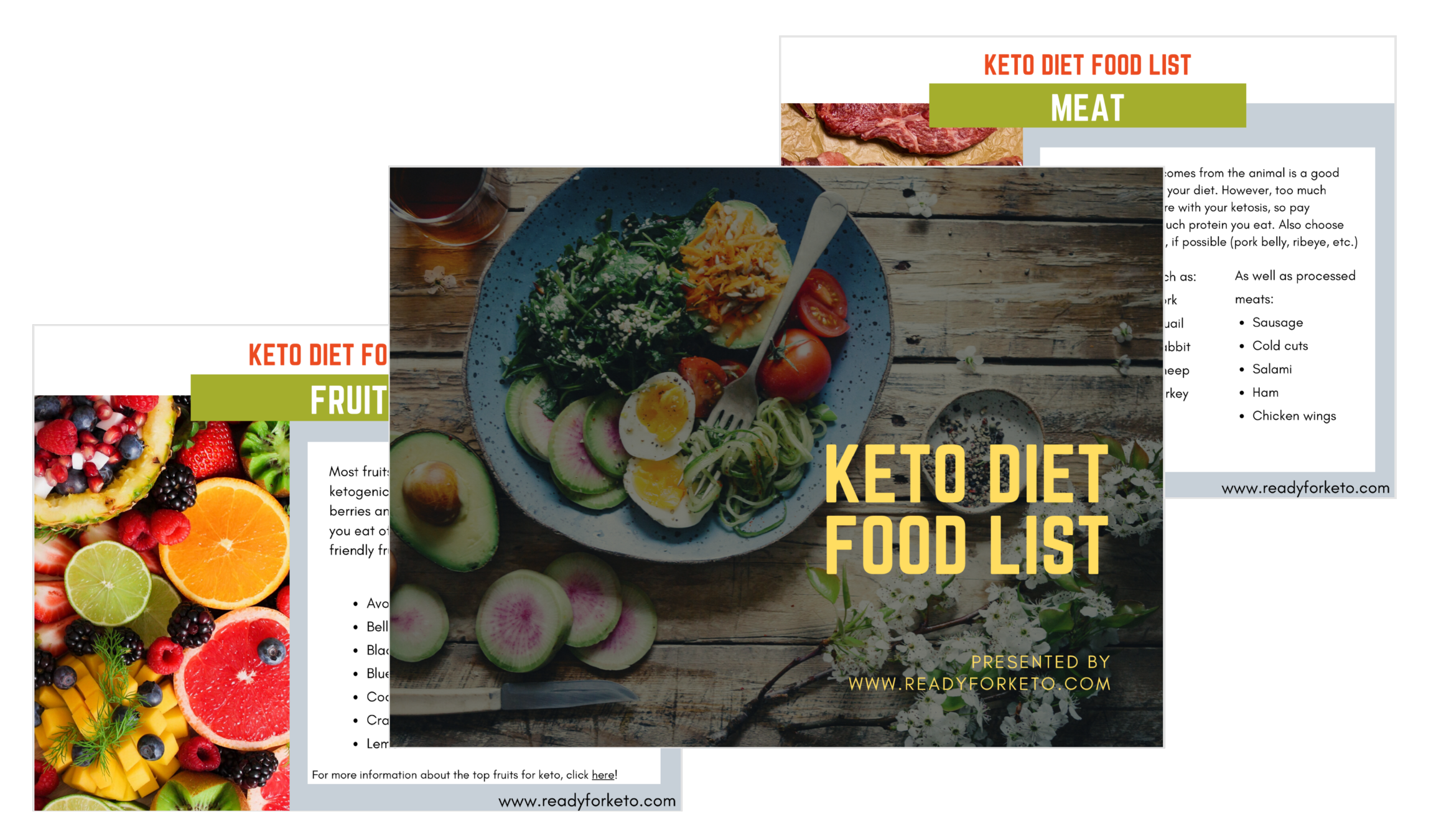
Get Your Keto Diet Food List PDF Here
Conclusion
So, to sum it up, the keto diet is a low-carb, high-fat diet with many wonderful benefits and can be a real wonder weapon in many areas.
However, switching to keto can be a bit of a challenge when you are completely new to the field.
Today’s post talked about how to get started with the keto diet, which foods to eat on the keto diet, and even includes a keto meal plan. I hope this info can help you get started with the keto diet so you can experience some amazing results!
Thanks for reading!
Anna
www.readyforketo.com
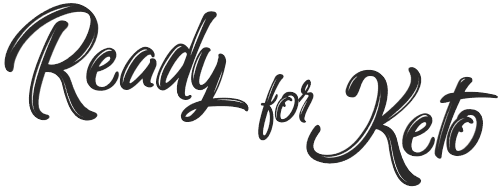




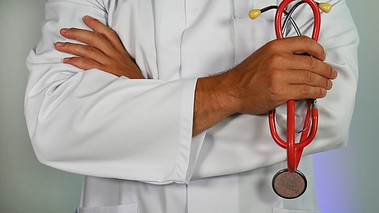
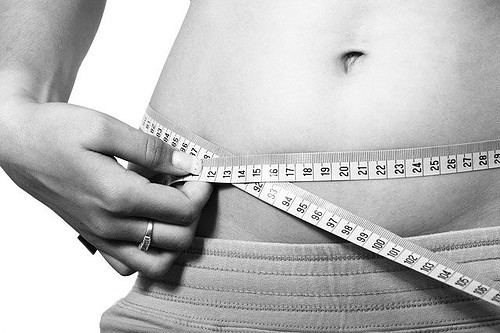
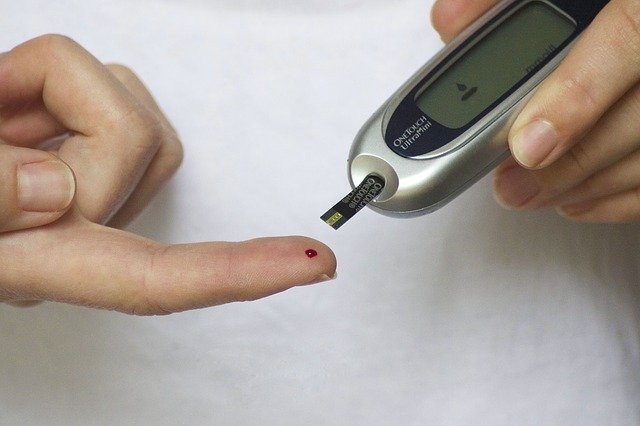
it has been made clear that trying to loos weight without the risk of getting disease can be achieved by keto diet. however there are other uses of keto diet and you have explained some of these explicitly.
i came across a doctor who mentioned treating epilepsy with keto diet and i got lost then but now i understand why.
There has been so much talks about keto diet among my friends and now i have finally given in. i want to start up my diet and this article is all i need at the moment. i am considering going for high protein keto diet and i am hoping it will turn out really good for me. thank you for this tips
Thanks for reading!
Good luck on your journey! Here is some more info about protein on a keto diet!
Nice discussion of keto diet. I have been reading quite a bit about this recently and it seems like a relatively easy plan to follow. I used the Atkins diet many years ago and had success – but it didn’t seem to offer as many options for fresh produce. I really like the 7-day menu you provided, because it gives me an idea of what going on this diet would entail.
I like to cook with a lot of spices – like basil, oregano, sage, cumin, turmeric, pepper, garlic, etc. Those spices seem to provide a lot of flavor in foods to give a variety of tastes. I noticed in the article that you said some spices were okay. If I use pure spices without any added sugars or other junk, is that acceptable on the keto diet? Also – what about salt? Should it be limited or is salt ok?
Hi Janice,
If there are no carbs, then it’s ideal for keto 😉
As for salt, you actually may need a bit more than before you started a keto diet. You actually lose sodium on a keto diet, so a little extra salt is actually good! People actually usually have the problem of not enough salt on keto.
Thanks for reading!
Anna
What an amazing complete post of Keto Diets. I didn’t know that there were different variations. I have heard of the Standard, but not that of the High Protein Ketogenic Diet. I have been on the yo yo up and down dieting pattern for too many years. Lose 14 – 20 then jump back 10 as soon as I stop dieting. While I can see the benefits of the Keto Diet – my main goal is to just keep the weight off. I am pushing 70 years of age, and not active due to knee and spinal problems. Been looking for more than a diet, I’ve been looking for something that could become my way of living. Can the Keto diet be a way of eating all of the time, instead of just when I need to lose weight?
Hi Steve,
Thanks for reading!
The keto diet could be done continuously! As it offers many health benefits other than weight loss, it’s used to treat a number of ailments.
Did you know that the Keto diet initially started out as a treatment for epilepsy? It was simply found that weight loss was a side effect of this kind of diet!
If you would like to start with keto and want more info, check out these resources:
Keto Beginners Guide & 28 Day Keto Challenge
Anna
This text is amazingly structured and easy to read! I really enjoyed reading about keto diet as i am very into diets. But i have never tried a keto diet so i think i will try it after reading this. But i have a question, will sleep affect on if the keto diet will work? I do usually sleep very late because i am busy working.
Amazing job and keep up the amazing work!
Hi Ragul,
Thank you!
When starting the keto diet, initially you may feel a bit more tired than usual. Fatigue can be an effect of your body switching into Ketosis. However, once your body is in ketosis, most people report they had more energy than before!
Personally, it has never affected my sleep 🙂
Good luck!
Anna